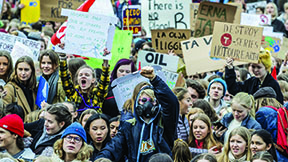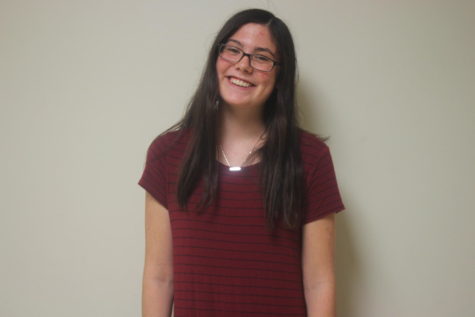Student interns in Serbia

The Center for Applied Nonviolent Action and Strategies posted this photo on its Twitter account featuring adolescents in Norway marching in a climate change movement (aftenpost.com).
September 20, 2019
For the past 10 years, Alex Kostich ‘21 has spent a month and a half of his summer visiting his family in Serbia. This summer, he dedicated five weeks to interning at the Center for Applied Nonviolent Action and Strategies (CANVAS).
CANVAS is an international nonprofit that promotes the use of non-violent resistance in the fight for human rights and democracy, according to its website.
“It’s all about nonviolent activism, which I don’t think people have the right view of,” Alex said. “When people hear nonviolent activism, they always think of hippies and that type of movement, but it’s such a more powerful movement than that.”
A nonviolent activist group, Otpor! (Resistance! in English), was very influential in the take down of the corrupt Serbian government in the 2000s. Alex’s parents, Marko and Mina Kostich, would often talk about this group, he said. In January, Alex decided to search the name of the group’s leader, Srdja Popovic. He found that Srdja Popovic had also started the organization, CANVAS, in Belgrade, Serbia.
After a few emails and a Skype interview, Alex had a summer internship.
“I was very happy to hear Alex would get involved with such an influential man as Srdja Popovic,” Marko said. “I knew Alex would learn so much from his new organization.”
Alex worked five days a week from 10 a.m. to 4 p.m. During this time, he completed weekly reports that detailed the state of countries where activists were contacted by the organization. One such country was Greece.
“That’s the whole thing about nonviolent struggle,” Alex said. “It’s a war, but you’re not fighting back; that’s the best type of warfare. Because if you’re using violence back, you’re just fighting. With nonviolent struggle, you can clearly see who the good guy or bad guy is.”
Alex and the other interns were also assigned research projects. One project focused on “laughtivism”, a form of nonviolent activism that uses humor and mockery to benefit the cause, he said.
CANVAS has done work in almost 50 different countries, according to their website. While there are places of ongoing struggle, such as Zimbabwe and Venezuela, they have also had many successes in places such as Lebanon and Egypt.
“It helped me see more of a globalized world and how strength in numbers is a real thing,” Alex said. “It really works. Nonviolence is all about strength in numbers–the more people you get to protest, the more people you get involved, the more people you get to make a stir, do anything… it’s more beneficial for your cause.”
Alex’s work at CANVAS has increased his interest in foreign politics and affairs, Marko said. He is also now considering nonprofit work as a possible career.
“I would love to see him help others on a daily basis like Srdja and his colleagues did for the people back home in the 2000s,” Marko said. “The connections he made in the organization will hopefully last a long time–a globalized man [Popovic] is a rich asset.”





















![Movie poster for '[Rec]" (2007).](https://www.lionnewspaper.com/wp-content/uploads/2023/04/rec-640x900.jpg)


